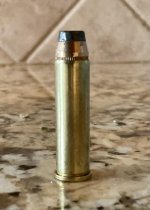dwever
Member
Was buying a few boxes of the pictured .357 for Range ammo and the sales person insisted JSP shoots dirtier than FMJ due to the exposed lead. I said without a compensator cleaning is the same with either, JSP won't lead the barrel as the jacketed portion will be in contact with the rifling
Korth’s cylinder gap is spec’ed at 0.003 inches, so I leave as little behind as possible.
Who is right? - Thanks!
Korth’s cylinder gap is spec’ed at 0.003 inches, so I leave as little behind as possible.
Who is right? - Thanks!
Attachments
Last edited:


